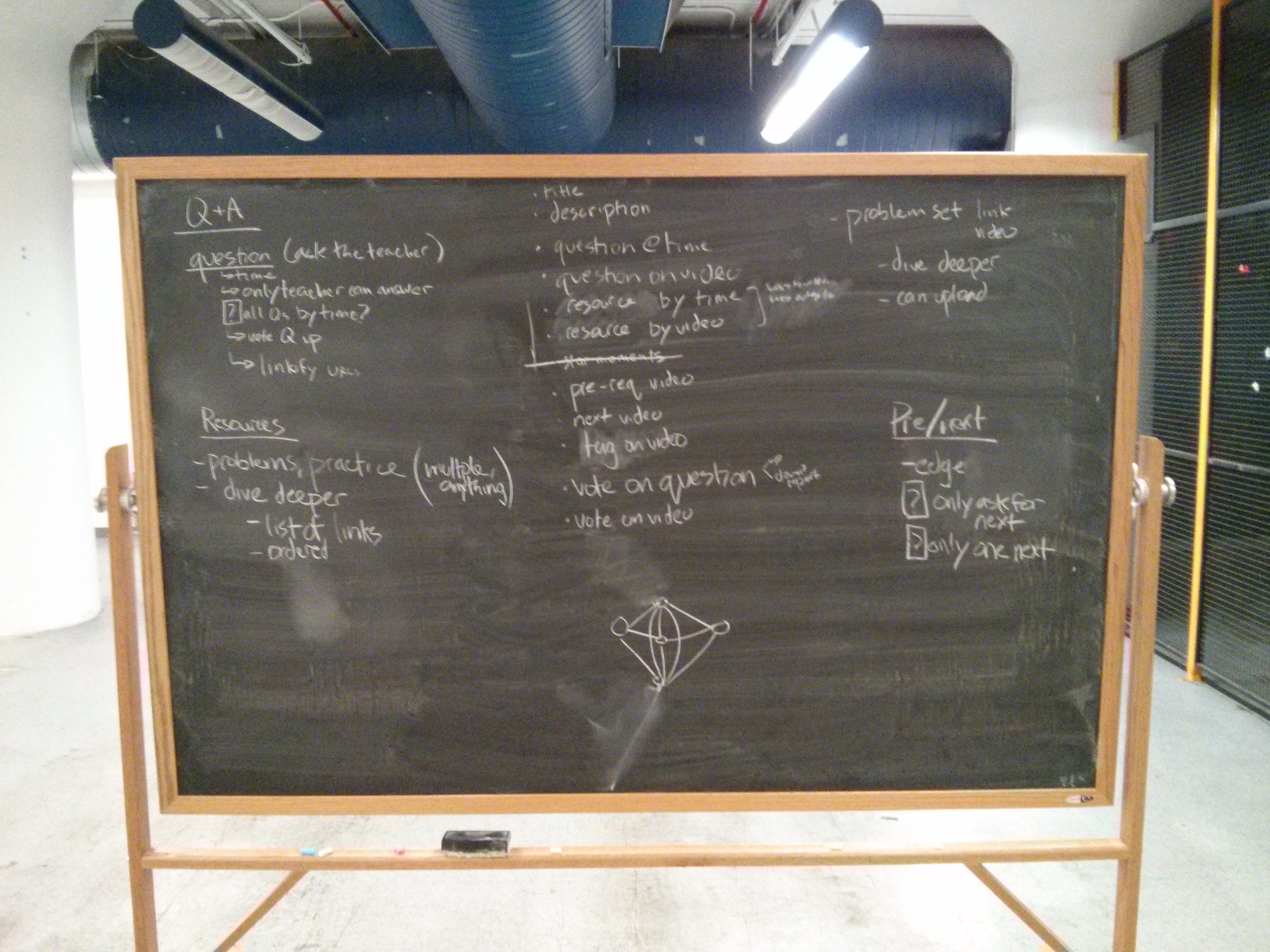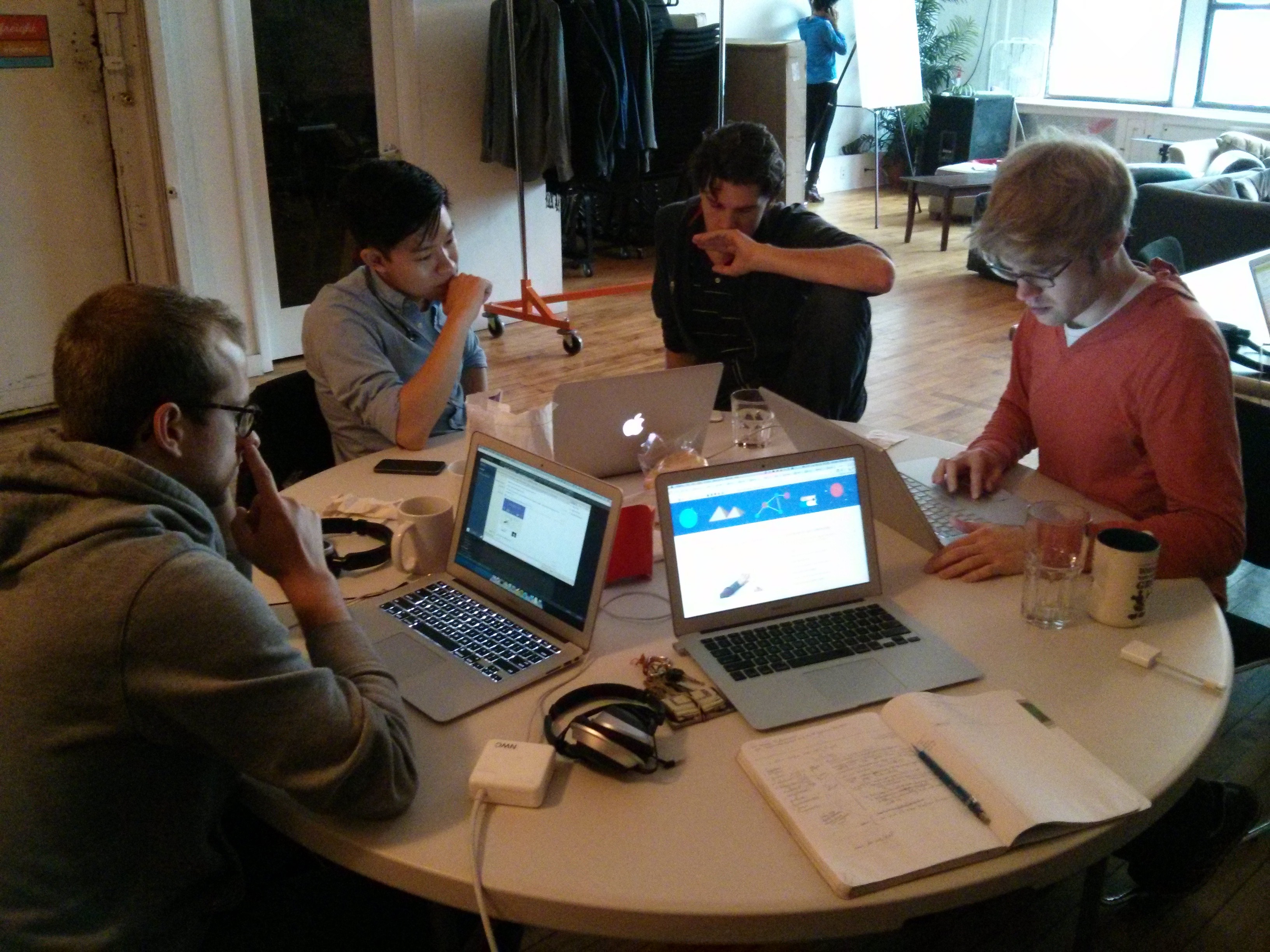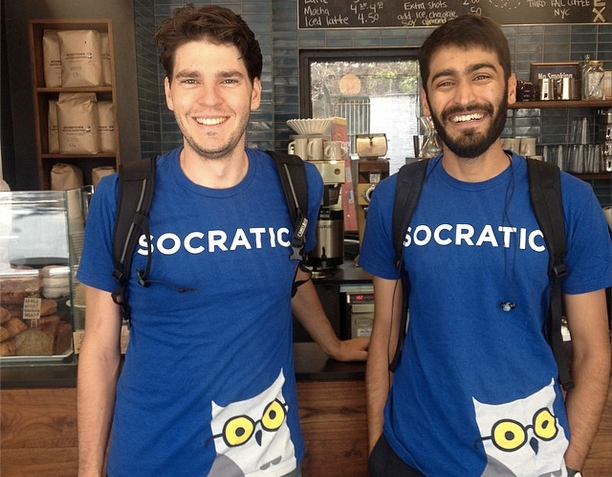Make the internet a better place to learn
How did Socratic start?

I first met Shreyans Bhansali in early 2013. We had both spent years working at tech companies (Google, Venmo) and wanted to work in education.
We saw education as the "root of all good": we thought we could either try to tackle every problem in society one by one, or we could try to give more people access to better education so they'd be empowered to tackle more problems.

We looked at the internet and saw this amazing communication medium which was falling short of its promise of helping students.
When students turned to the internet for help, they usually ended up on unhelpful sites like Yahoo Answers or Wiki Answers.
We thought the internet could do a lot better. We'd seen online communities build amazing resources like Wikipedia and StackOverflow when they were driven by a shared mission and we knew there were a lot of people in the world who cared about students having free access to better learning content.
So we started building Socratic.

The first version of Socratic was extremely simple and Chemistry was the only subject available. Tyler DeWitt became the first teacher to add content. Soon after, David joined as our designer and Kuba joined as engineer.
The Socratic community started growing and soon included people from all over the world contributing to making learning easier.

Why should we think twice before answering questions with phrases such as, "it's really simple" or "the solution is very easy"?

Answer:
Because what seems easy, straight-forward, or simple to you may be something a student has struggled to understand for a while now.
Explanation:
One of the best parts about Socratic is that it is an anonymous way for students to ask questions, even very basic questions. When we answer a question with, "If you think about it, it's really simple" or something along these lines, you might not realize that a topic you find easy to understand is a topic the student has seriously struggled with.
These phrases seem harmless, and some of the time they probably are. Other times a student may have already asked a teacher for help, searched for the answer on the internet, and that student is still stuck. Many students of all ages don't feel comfortable enough to raise their hand in class and ask for help, but they should be able to do so here. By saying, "If you think about it, it's really simple," you imply that the person hasn't thought about the topic, and you imply that the answer is easy, which it might not be.
Everyone has struggled with some subject at one point in their life, and for all you know, the person asking this question might be having a very difficult time, so, in my opinion, omit these types of phrases and stick to explaining the topic.
Where can I find the Socratic app?

UPDATE
The Socratic app is now available for Android devices!
The app is also available for iOS devices.
You can read about how the app works here.
Download it and let us know what you think!
Original post:
Is Socratic building an app?
Yes! As you know, we care deeply about helping students learn. When we started Socratic in 2013, we wanted to improve what students found when they turned to the Internet for help.
Three years later, this community has far exceeded that goal, and is still creating unbelievable answers every day. For that, students are emphatically grateful.
Every student deserves this experience. And today, when they're struggling, many students turn to their phones for help (some out of convenience; others because they simply don't have access to a desktop computer).
So we’re building an app that will bring the magic of the Socratic website directly to any student with a smartphone.
In the app, we hope to make the learning experience for students as accessible as possible.
We’ve built easier ways to ask a question, and we’ve used machine learning to analyze those questions and take students directly to the most relevant, helpful material—just as a tutor would.
In this way, the app will allow the learning content you create on the Socratic website to reach more students and help them in new ways, and we can’t wait to see just how far we can take this together. More students, more questions, more answers, more learning.
What do you think?
Socratic Meta—what is it good for?

Socratic Meta is a place that the Socratic community can use to ask questions and find out more about how Socratic works and share thoughts and ideas on how it can be improved.
Think of Meta as our very own Town Hall -- a platform that allows us to discuss and promote the mission and the values of the community, to help each other navigate and make the most out of the features that Socratic offers.

In a nutshell, Meta is a place that we can use to grow as a community and as a site.
Moreover, Meta will provide contributors with a communication channel for getting in touch with the members of the Socratic team, as well as with moderators, heroes, and featured answers reviewers.
Every contributor is encouraged to use Meta to
- suggest new features or ways to improve the current ones
- ask for help or clarification about anything related to Socratic (the website and the app) or its community
- report inappropriate or abusive questions, answers, or users
- report bugs
In this regard, it's important to keep in mind that Meta is not a random discussion area, so please do not use Meta for discussion topics that are unrelated to Socratic.
Avoid asking questions such as
- What is your favorite movie/food/color/book/band/sports team etc. ?
- Do you have a pet?
- How old are you?
- Do you have any siblings?
- Android or iOS?
and so on and so forth. You get the idea.
Thank you and see you in Meta! :D
Why shouldn't we get angry or annoyed when someone edits our answer?

Answer:
Remember the goal of Socratic is to provide high-quality answers that help everyone learn.
Explanation:
I've heard from a few people that they don't like editing answers because people get very defensive and upset when this happens. This is a little disappointing because it means we're letting our egos get in our way and forgetting what Socratic is all about.
Anyone can write and edit someone else's answer on this site, and we should all feel free to do so. The goal of Socratic is not to be like Yahoo Answers and provide a quick, one sentence solution. The goal is to help students learn and to actually teach one another. Answers on Socratic are more in-depth, they explain processes and show how we arrived at our answer, and they serve to help someone truly understand the concept.
If someone edits or adds to your answer and the answer is more complete and improved, why get angry? Why wouldn't we want someone to learn? Many of the times I edit, to add an image or to provide more information, I'm simply filling in gaps I see. I take great content and improve it, allowing readers to more quickly or more thoroughly understand. We should all feel free to do this.
Occasionally, I edit to correct for accuracy and I've had other users edit my answers for accuracy sometimes. This is an especially important type of edit because we don't want to give wrong information! If you see something that is wrong, please edit the answer! You can write a comment if you'd like, but I recommend changing the actual answer as soon as possible because not all readers go through the comments.
What to do if someone gets annoyed that you edited their answer:
-
Remind them not to take it personally and that the goal of Socratic is to create great content that helps people learn. You were simply trying to do that.
-
Direct them towards this question and answer.
-
Message a Hero or Moderator and ask them to send a quick note to the user.
When you should get annoyed at someone editing your answer:
-
If someone completely removed something in your answer and it was correct.
-
If someone adds incorrect information (edit it and remove it!).
-
If someone adds content to your answer and you think it's confusing and makes the answer harder to understand. **Note, this doesn't mean you should just delete what the person did, but instead perhaps try and edit what they wrote to make it accessible. Try having a dialogue with the person about the answer and work together to make it complete and clear.
If any of the above happens, you can always message a moderator and let them know. The moderator can then look into the matter.
[Announcement] Newcomers to Socratic will now have restricted access to the site - "?"

Answer:
Info on a new safety change implemented by the team!
Explanation:
As part of a new change aimed at protecting Socratic content, newcomers to the site can no longer
- edit answers that have been written by other contributors
#-># newcomers can edit their own answers- post answers to questions that have already been answered
#-># newcomers can post answers to unanswered questions
In addition to these two key features, newcomers will also not be able to
- edit or move unanswered questions, including their own
- report questions or answers
- clear double-check flags raised on answers
The decision to limit the activity of newcomers was taken in light of a significant surge in extraneous and unwanted content added to the site.
Newcomers will often edit old answers or use the ability to add multiple answers to a question to spam, hawk, post abusive remarks, or simply add low-quality content.
Mind you, not every newcomer that lands on Socratic falls in that category, but the number of newcomers who impact the site in a negative way is simply too large to ignore.
In an effort to protect the content posted on Socratic, we decided to block newcomers from editing answers posted by other contributors and from posting answers to questions that have already been answered.
Ok, so what exactly is a newcomer?
We consider a newcomer to be a user who has not accumulated at least
- if the activity days are consecutive or not
- of how many answers the user posts in this time interval
Keep in mind that in order for a given day to count as an activity day, the user must post one or more answers--questions asked do not count!
During this
Newcomers must not
- post one-word, one-sentence, or solution-only answers
- post copied content of any kind, regardless if they cite the original source in the answer or not
- add images taken from other websites to their answers without citing the source of the image
- post unformatted math answers
When newcomers meet the aforementioned criteria, the block will be lifted. At this point, they will be considered safe members of the community and they will be able to edit answers written by other contributors and post answers to questions that have already been answered, along with gaining access to the other features I mentioned above.
If a newcomer falls short of accumulating
This will continue until the user will accumulate
